
- •Vocabulary
- •Where does she come from?
- •Vocabulary
- •Vocabulary
- •It all went wrong
- •It was 3 o'clock in the morning when four-year- old Russell Brown woke up to go to the toilet.
- •His parents were fast asleep in bed
- •Grammar spot
- •It (rain) and it was cold, and my bed was
- •Vocabulary
- •V erb patterns 1 • Future forms • Hot verbs • How do you feel?
- •О We’re going out to have a meal.
- •Your class has decided to have a party. Everyone must help. Say what you’ll do. .
- •Your teacher didn’t hear what you said. Listen to your teacher and correct him/her.
- •Talking about you
- •I( I live in a hotel and when I come home from school, there are maybe 80 people who say 'Good day' to me.
- •I'm going to be a model. 7 Emily, aged 10
- •Vocabulary
- •If the sky above you
- •W starter hat is the capital city of your country? What is the population? Is it an old or modern city?
- •It’s beautiful.
- •You What's the weather like?
- •The Richest, Meanest Woman in the World
- •Donna flynn & terry wiseman
- •Vocabulary
- •Kate is very fussy about food. She eats
- •2 A Did you see the football last night? в Yes, .
- •I have to ... I don’t have to...
- •El He has a nice car. □ She has to get up early.
- •Which countries are they talking about?
- •Take / clothes / what / should /1?
- •1 We're travelling round the world... [c] We’re going to leave... □ □... Were going to learn to scuba dive on the Great Barrier Reef.
- •2 Look at these hopes for the future. Make sentences using If... Will...
- •Vocabulary
- •Vocabulary
- •Vocabulary
- •I sweet dreams Second conditional 1 Read about Nicola. Which text describes her life? Which describes her dreams? f I were a princess. I d
- •I wouldn't go to school. I'd have a private
- •‘What you (do) if a stranger (give) you £1 million?’
- •Vocabulary
- •Came here to look for work, and I never left.
- •) Married for nearly ten years and that they
- •) Very happy together
- •_ Never stop writing, not
- •Met her while I was living in Paris.
- •Don’t think it’ll rain this afternoon.
Vocabulary
N
Making negatives
ouns, verbs, and adjectives
1 Look at these common noun and adjective suffixes. They are used to form different parts of speech.
We can make adjectives and verbs negative by using these prefixes.
nouns |
-ation -ion -ness -ity -ence -sion -ment |
adjectives |
-ous -y -tific -ly -ful -less -ial |
adjectives |
.t I .e i § |
verbs |
un- dis- |
Complete the charts below and mark the stress. There are some spelling changes.
1
2
3
4
5
6
7
8
9
10
2 Complete the sentences with one of the words from exercise 1.
My English a lot after I lived in London for a month.
I have two in life. I want to be rich, and I want to be
famous.
‘I’m going to work hard from now on.’ ‘That’s a very good
There are many between my two children. They aren’t
similar at all.
Thank you for your advice. It was very .
I like Italian people. They’re very kind and .
The United Nations is an international .
I asked the teacher for help, but unfortunately, I didn’t understand his .
Motor racing is a very sport.
Fish soup is a of this area. You must try it.
I’m having a party on Saturday, and I’d like to you.
This is the part of my town. There are lots of factories
and businesses.
Noun |
Verb |
coMwuni'cation |
communicate |
|
discuss |
|
govern |
invi'tation |
|
|
develop |
|
explain |
education |
|
|
de'cide |
|
enjoy |
|
'organize |
im'provement |
|
|
employ |
Noun |
Adjective |
science |
|
friend |
|
|
'happy |
|
'different |
'danger |
|
use |
|
help |
|
|
'special |
care |
|
noise |
|
'industry |
|
am'bition |
|
Complete the sentences, using a word from the box and a prefix.
pack possible agree tidy fair like appear employed legal polite
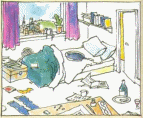
Don’t go into my bedroom. It’s really
I can’t do maths. For me, it’s an
subject.
don’t fish. I just prefer
meat.
It’s very to ask someone
how much they earn.
When we arrived at the hotel, we
our suitcases.
was for two years. Then
got a job in an office.
‘I think learning languages is stupid.’
‘I . I think it’s a good idea.’ I
The thief stole my bag, ran into the
crowd and . I never saw
him again.
Cannabis is an drug in
many countries.
You gave her more money than me! That’s !
_ six o’clock _ last night
_ Saturday _ December _ summer _ yesterday evening
1995
_ the weekend _ two weeks ago _January 18
March Mars >Iarж
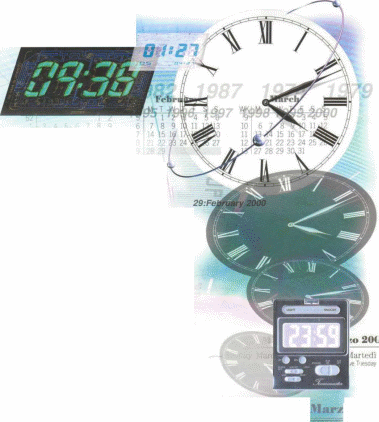
EVERYDAY ENGLISH
Time expressions
There are two ways of saying dates. What are they?
8/1/98 16/7/85 25/11/02
■HI
Listen and check.Look at the same dates in written American English.
What’s the difference?
1/8/98 7/16/85 11/25/02
HI I Listen and check.
Practise these dates. They are in British English.
4 June 5 August 31 July 1 March 3 February
21/1/1988 2/12/1996 5/4/1980 11/6/1965 18/10/2000 31/1/2005
Listen and check.
What days are national holidays in your country?
Complete these time expressions with at, on, in, or no preposition.
_ the evening
►► Grammar Reference 3.4 pl32.
Ask and answer the questions with a partner.
D
13 Monday Lundi Monfag times Luik
** у w T
o you know exactly when you were born?
w as
born at two o’clock in the morning on Wednesday, the twenty-fifth
of June, 1979.
as
born at two o’clock in the morning on Wednesday, the twenty-fifth
of June, 1979.
When did you last ... ?
g
go to a party
do an exam
see a lot of snow
clean your teeth
catch a plane
play a sport
give someone a present
have a holiday
watch TV
Let’s go shopping!
m
 uch/many
• some/any
• a few, a little, a lot of
• Articles • Shopping • Prices
uch/many
• some/any
• a few, a little, a lot of
• Articles • Shopping • Prices
P
STARTER
lay the alphabet game with things you can buy. Continue around the class.A Yesterday I went shopping and I bought an apple.
В Yesterday I went shopping and I bought an apple and some bread.
С Yesterday I went shopping and I bought an apple, some bread, and a car.
D Yesterday...
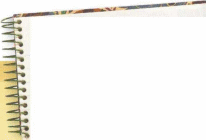
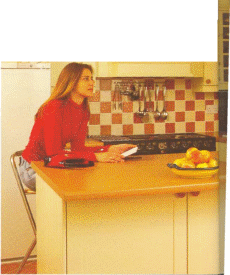
moOk.
e&QS
boM&r
ecuu,scLg&5
UTLTUL
or'^sp^
THE WEEKEND SHOP
Quantity
1 Sarah and Vicky are two students who share a flat. It is Saturday morning, and Sarah has written a shopping list.
Ш1 Read and listen to their conversation.
It says here milk. How much milk do we need?
S Two pints.
And eggs? How many eggs?
S A dozen.
And what about potatoes? How many potatoes? S A kilo’s enough.
And butter? How much?
S Just one packet.
2 Match these quantities with the shopping list.
a bottle of red |
six cans |
just one white loaf |
six pork ones |
200g of Cheddar |
four big ones |
four packets |
|
Continue the conversation with a partner.
Can we count milk (one milk, two milks) ? Can we count eggs (one egg, two eggs) ? When do we say How much...?
When do we say How many...?
►► Grammar Reference 4.1 p1J3
GRAMMAR SPOT
some
one/body
where
) cm Read and listen to the rest
of the conversation.
Do we need anything else?
S Let’s have a look. We’ve got
some apples, but there aren’t any grapes. And there isn’t any coffee, but we’ve got some tea.
Is there any orange juice left, or did somebody finish it?
S There’s a little, but there isn’t much, so we need some more.
And vegetables? Have we got many vegetables?
S Well, I can see a few carrots, but there aren’t many onions.
Oh, and don’t forget we need a lot of crisps. My nephews are coming tomorrow!
S Right, then. I think that’s everything. Let’s go! By the way, how much money have you got?
GRAMMAR SPOT
Find seven count nouns (CNs) and four uncount nouns (UNs) in the conversation.
Tick (/) the correct columns.
We use ... |
with CNs |
with UNs |
in positive sentences |
in questions |
in negative sentences |
some |
У |
У |
У |
У (sometimes) |
X |
any much many a lot/lots of |
У |
У |
У |
У |
У |
a few a little |
|
|
|
|
|
Look at the forms of something/someone, etc. The rules are the same as for some and any. Find two examples in the conversation in exercise 3.
Grammar Reference 4.1 рШ
P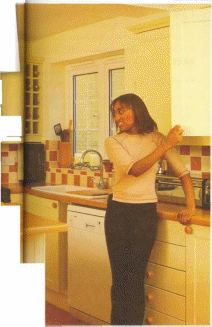 RACTICE
RACTICE
Discussing grammar
Complete the sentences with some or any.
Have you got brothers or sisters?
We don’t need olive oil.
Here are letters for you.
I need money.
Is there petrol in the car?
Complete the sentences with much or many.
Have you got homework?
We don’t need eggs. Just half a dozen.
Is there traffic in your town?
I don’t know students in this class.
How people live in your house?
Complete the sentences with a little, a few, or a lot of.
I have close friends. Two or three.
He has money. He’s a millionaire.
‘Do you take sugar in coffee?’ ‘lust . Half a spoonful.’
‘Have you got CDs?’ ‘Hundreds.’
I’ll be ready in minutes.
She speaks good Spanish, but only Russian.
toothbrushes toothpaste toilet paper
make-up
shampoo
towels
Questions and answers
Look at Sarah and Vicky’s bathroom. Ask and answer questions with a partner about these things:
hairbrushes
soap
bottles of perfume
something/someone/somewhere
Complete the sentences with the correct word.
some |
|
thing |
any |
+ |
one/body |
every |
|
where |
no |
|
|
‘

who knows you!’
nice at the party?’
Did you meet _ ‘Yes. I met‘Ouch! There’s
m my eye
‘Let me look. No, I can’t see .’
‘Let’s go hot for our holidays.’
that’s too
‘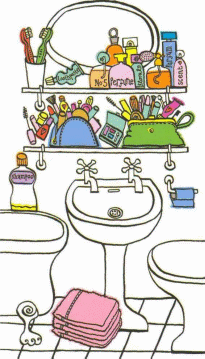 But
we can’t go
But
we can’t go
expensive.’
‘I’m so unhappy. loves me.’
‘I know who loves you. Me.’
I lost my glasses. I looked , but I
couldn’t find them.
‘Did you buy at the shops?’
‘No, . I didn’t have any money.’
I’m bored. I want interesting to
. interesting to talk
read, or
to, or interesting to go.
It was a great party. loved it.
Listen and check.
Town survey
Work in groups. Talk about the good things and bad things about living in your town. Make a list. Compare your list with the class.
Good -Bm^S
IWtre, art a I ok o-f ca^t s and rtskanran.H.
1htrt cure. Some aood shops.
We. cm cp ол lo+s o-C wiatks.
bad
Ъик u)t cpk ащ qood dabs.
TWtrt artn'k нкащ . . .
There's олЦ one. . . .
There. iSn + anquihtrt khak ult can. . . .
M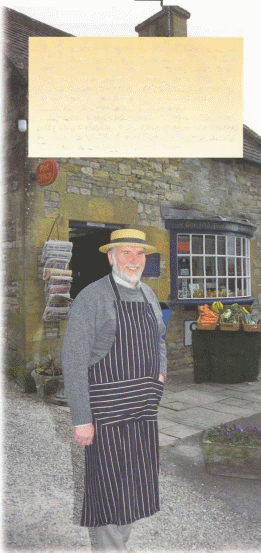 Y
UNCLE'S A SHOPKEEPER
Y
UNCLE'S A SHOPKEEPER
Articles
1£K1 Read and listen to the text.
GRAMMAR SPOT
Find examples of the definite article (the) and the indefinite article [a/an).
Find examples of when there is no article. ►► Grammar Reference 4.2 p!33
My uncle’s a shopkeeper. He has a shop in an old village by the River Thames near Oxford. The shop sells a lot of things - bread, milk, fruit, vegetables, newspapers - almost everything! It is also the village post office. The children in the village always stop to spend a few pence on sweets or icecream on their way home from school.
My uncle doesn’t often leave the village. He hasn’t got a car, so once a month he goes by bus to Oxford and has lunch at the Grand Hotel with some friends. He is one of the happiest men I know.
PRACTICE
D
**
iscussing grammarIn pairs, find one mistake in each sentence.
He’s postman, so he has breakfast at 4 a.m.
The love is more important than money.
I come to the school by bus.
I’m reading one good book at the moment.
‘Where’s Jack?’ ‘In a kitchen.’
I live in centre of town, near the hospital.
My parents bought the lovely house in the country.
I don’t eat the bread because I don’t like it.
Complete the sentences with а/ап, the, or
nothing.
I have two children, boy and
girl. boy is twenty-two and
girl is nineteen.
Mike is soldier in Army, and
Chloe is at university.
My wife goes to work by
train. She’s accountant. I don’t have
job. I stay at home and look
after children.
What lovely day! Why don’t we go
for picnic in park?
‘What did you have for lunch?’ ‘Just
sandwich.’
READING
T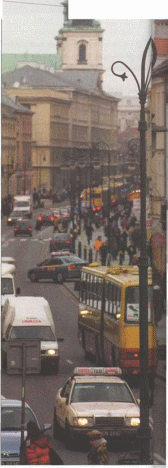 he
best shopping street in the world
he
best shopping street in the world
1 Match a famous shopping street with a town, a store, and a product.
Street |
Town |
Store |
Product |
Oxford Street — Champs-Elysees \ Fifth Avenue Via Montenapoleone |
Milan New York . - London ^ Paris |
Guerlain •— Marks and Spencer' Gucci Tiffany’s |
- underwear and jumpers leather goods jewellery perfume |
Read the headline and the introduction of the newspaper article.
Does anything surprise you? What do you want to find out when you read the article? Write some questions.
Read the article quickly and answer the questions you have written. What is the best summary of the article?
Nowy Swiat is the best shopping street in the world because ...
... so many Polish people go walking there.
... it is a pleasant place to shop and the shops are small.
... everything is very expensive and very exclusive.
... the shops sell quality goods that you can’t buy anywhere else.
Read the article again and answer the questions.
How do we know that Nowy Swiat is the most popular shopping street?
Why is it such a nice place to go shopping?
What can you see in the photos that is described in the article?
Why don’t many foreign people go to Nowy Swiat?
Why are the things produced by Polish manufacturers so good?
What can you buy here? What can’t you buy?
What is expensive? What isn’t expensive?
What’s good about Cafi Blikle?
What is special about the shops in Nowy Swiat?
Language work
Complete the sentences with different ideas from the article.
In Nowy Swiat, there are a lot of... There isn’t any ...
There aren’t any/many... There are some ...
What do you think?
What are some of the famous brands and products that you can buy in many countries of the world? Think of clothes, food, cars ....
Make a list. Work in groups and choose the most famous three. Compare your list with the class.
What is the main shopping street in your town? WTiat can you buy there that’s special?
Do you enjoy shopping? What do you like shopping for? What don’t you like shopping for?
No, it isn't Oxford Street, the Champs-Elysees, or even Fifth Avenue. A new survey shows that the most popular shopping street in the world is ... Nowy Swiat. Where's that? In Warsaw, Poland, of course. by anne applebaum
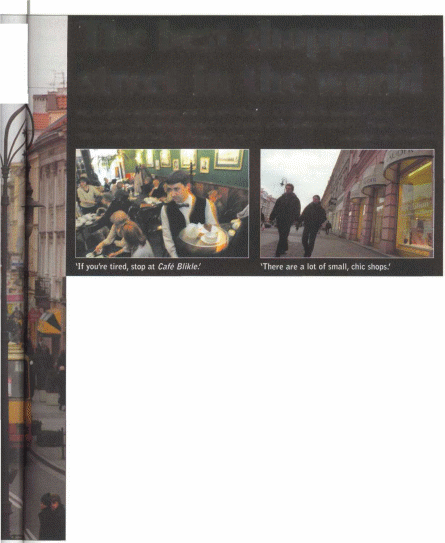
The best shopping street in the world
A recent survey has shown that the busiest shopping street in the world is not in London, New York, or Paris, but in Warsaw. It's called Nowy Swiat (pronounced /iidvi Jviat/), which means New World. An incredible 14,000 Poles walk down this main street every hour.
It is a lovely place to shop. The pavements are very wide. There are statues, palaces, attractive town houses, exclusive cafes, and high-class restaurants. The buildings aren't too tall. They look old, but in fact the whole city was rebuilt after World War II.
There aren't any billboards or neon lights. There isn't any loud music, and there aren't many tourists. People think that Polish shops have nothing to sell, so nobody comes shopping here. The world doesn't know about this paradise for shoppers -yet.
It is now possible to buy almost everything in Warsaw. There are a lot of shops from the West, but the interesting thing is that Polish manufacturers are now producing high quality goods. They are good because they are not mass produced for world consumption.
Nowy Swiat has a lot of small shops, specialist shops, and chic shops. It hasn't got the huge department stores that sell the same things everywhere.
If you want an exquisite handmade suit, Nowy Swiat is the place to go. It isn't cheap. You will pay up to £1,000. For beautiful French baby clothes, go to Petit Bateau. You will pay £50 for a pair of blue jeans for a baby. A dress for a baby girl is about £90. At Desa, a famous antique shop, a desk costs
£5,000, and a 19th century Russian icon is £200.
Not everything is expensive. At the shop Pantera you can buy leather goods - handbags, purses, coats, and belts. Cepelia specializes in folk art. There are also book shops and record shops. And there are a lot of small boutiques that sell men's and women's clothes that aren't too expensive.
If you're tired, stop at Cafe Blikle. This is a fashionable place to meet. You'll find a lively atmosphere, and a lot of well-known Poles. The frozen yoghurt and ice-creams are excellent, and its famous doughnuts are delicious.
It is possible to travel the world and find the same things for sale in every country. But Warsaw is different because its shops are unique - and they're in Nowy Swiat.
VOCABULARY AND LISTENING
Buying things
a clothes shop |
a chemist’s |
a cafe |
a bank |
a newsagents |
|
|
|
|
|
1
What
can you buy or do in these places? Write two things for each place.
Compare
your ideas with the class.
itH Listen to the conversations. Answer the questions.
Where are the conversations taking place? Choose from the places in exercise 1.
What does the customer want?
Can the shop assistant/cashier help?
How much does the customer pay?
Complete these lines from the conversations. Look at the tapescript on p64 and check your answers.

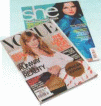
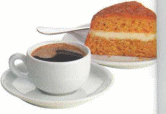
В
A
В
A
Here you are.
That’s great.
Of course. The changing rooms are over there.
4
A
В
A
В
В
A
В
A
В
A
В
A
В
A
В
A
2 A help me?
I’m looking for this month’s edition of Vogue. Can you tell me
?
В Over there.
Middle shelf. Next to She.
1 A Hello. Can I help you?
В I , thanks.
В I’m looking for a jumper
. Have you got.
A I’ll just have a look.
are you?
Medium.
How much is it? £39.99.
OK. I
How would you like to pay?
I like it. It
Good morning. Can I have a
please?
Espresso?
Yes, please. Oh, and a doughnut, please.
there aren’t
We’ve got some delicious carrot cake, and chocolate cake.
OK. Carrot cake, then.
Certainly. Is
Yes, thanks.
, please.
Thank you.
3 A Hello. I help me. I’ve got a bad
cold and a sore throat. Can you ?
В OK. You can take these three times a day.
A Thank you. some
tissues , please?
В Sure. ?
A No, that’s all, thanks.
E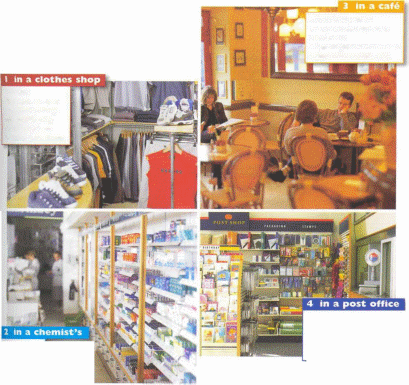 VERYDAY
ENGLISH
VERYDAY
ENGLISH
Prices and shopping
Look at the way we write and say prices in British and American English. Practise saying them.
British English |
American English |
|||
Written |
Spoken |
Written |
Spoken |
|
£1 |
a pound |
$1 |
a dollar |
|
50p |
fifty p |
50C |
fifty cents |
|
£1.99 |
one pound ninety-nine |
25C |
a quarter |
|
£16.40 |
sixteen pounds forty |
IOC |
a dime |
|
ggfl Listen to the conversations and write the numbers you hear.
W
a black/white coffee an espresso/a cappuccino a pot of tea
a sparkling/still mineral water a piece of chocolate cake
hat’s the exchange rate between sterling/US dollars and your currency? There are about five ...to the dollar.
In your country, how much is ... ?
a pair of jeans • a packet of cigarettes
a hamburger • a litre of petrol
Make conversations in these places with a partner.
Use the ideas to help you.
a shirt/tie
What size are you? small/medium/large too small/too big I'll have it, please.
I
some stamps First or second class? a letter/postcard to Japan send this parcel to Mexico buy some envelopes
conditioner shaving foam deodorant stomach ache sore throat
'll leave them, thanks.What do you want to do?
